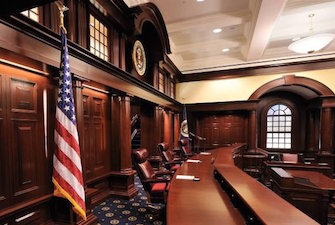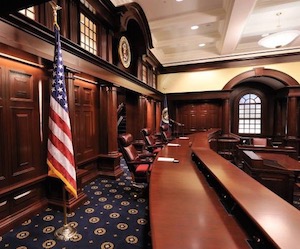Federal Circuit shines ray of hope for substitute claims in IPR
 Recently, the United States Court of Appeals for the Federal Circuit issued a decision in Nike, Inc. v. Adidas AG, relating to an appeal from the inter partes review (IPR) of U.S. Patent No. 7,347,011, owned by Nike.
Recently, the United States Court of Appeals for the Federal Circuit issued a decision in Nike, Inc. v. Adidas AG, relating to an appeal from the inter partes review (IPR) of U.S. Patent No. 7,347,011, owned by Nike.
The Patent Trial and Appeal Board (PTAB) of the United States Patent and Trademark Office (USPTO) granted the IPR petition filed by Adidas AG and instituted inter partes review of claims 1–46 of the ’011 patent. Nike then filed a motion to amend in which it requested cancellation of claims 1–46 and proposed substitute claims 47–50. The PTAB granted the motion to cancel claims 1-46, but denied the motion to substitute claims, as has become the norm in virtually all cases.
The patent legacy of Supreme Court Justice Antonin Scalia
 On Saturday, February 13, 2016, Justice Antonin Scalia of the United States Supreme Court passed away in a hotel room in Texas. Justice Scalia is perhaps best known for his conservative philosophy and desire to strictly construe the Constitution, relying on the text of the document. Justice Scalia was also ardently opposed to the use of legislative history to interpret statutes, again preferring a strict textual construction.
On Saturday, February 13, 2016, Justice Antonin Scalia of the United States Supreme Court passed away in a hotel room in Texas. Justice Scalia is perhaps best known for his conservative philosophy and desire to strictly construe the Constitution, relying on the text of the document. Justice Scalia was also ardently opposed to the use of legislative history to interpret statutes, again preferring a strict textual construction.
With Justice Scalia’s passing, some have started to already wonder what his absence will mean for a variety of different cases and issues. With respect to intellectual property, not much will change (if anything) as the Supreme Court moves forward to consider a number of patent and other intellectual property cases this term and in future years. Intellectual property is not an area where the Court divides ideologically, so we do not generally see 5-4 splits as are seen in many other areas of law.
For example, the three recent patent eligibility cases that have thrown the industry into something of a tailspin were all unanimous decisions — Mayo Collaborative Services v. Prometheus Laboratories, Inc. (2012); Association for Molecular Pathology v. Myriad Genetics (2013); and Alice Corporation v. CLS Bank (2014). The Supreme Court also reached unanimous decisions in eBay, Inc. v. MercExchange, LLC (2006)(ruling that a victorious patent owner does not have an automatic right to a permanent injunction; rather, the court must consider the four-factor injunction test, despite the fact that a patent grants a supposedly absolute exclusionary right to the patentee); and KSR International v. Teleflex, Inc. (2007)(fundamentally changing the obviousness inquiry by ruling that teaching, suggestion and motivation is not the only rationale to combine references to support an obviousness rejection). (more…)
02.26.16 | Patent Issues, Supreme Court Cases | Gene Quinn
Federal Circuit Affirms District Court on Infringement and Definiteness in Dow Chemical Case
 On January 29, 2016, the United States Court of Appeals issued a decision in AKZO Nobel Coatings, Inc. v. Dow Chemical Company, relating to an appeal from the United States District Court for the District of Delaware.
On January 29, 2016, the United States Court of Appeals issued a decision in AKZO Nobel Coatings, Inc. v. Dow Chemical Company, relating to an appeal from the United States District Court for the District of Delaware.
Akzo appealed from the district court’s granting of summary judgment that Dow did not infringe the claims of U.S. Patent 6,767,956, either literally or under the doctrine of equivalents. Dow cross-appealed from the court’s conclusion that the claims of the ’956 patent are not indefinite.
Claim 1 of the ‘956 patent was deemed representative and reads as follows:
1. A process for producing a dispersion of a polymer in an aqueous medium in which the polymer is dispersed in an aqueous medium in an extruder at a temperature above 100° C. in an extruder having an outlet
wherein the pressure in the extruder is maintained above atmospheric so that the aqueous medium does not boil characterized by maintaining the pressure above atmospheric for the extruder at the outlet with a pressurized collection vessel and
wherein aqueous dispersion from the extruder has at least 25% by weight of the aqueous medium where the aqueous medium has less than 40% by weight of organic solvent and
wherein the aqueous dispersion enters the outlet and pressurized collection vessel at a pressure above atmospheric so that the aqueous medium does not boil and is subjected to the action of a cooling zone to lower the temperature of the aqueous dispersion to below 100° C. to have an aqueous dispersion with a viscosity below 10 Pa.s.
02.24.16 | Federal Circuit Cases, Patent Issues, Patent Litigation, posts | Gene Quinn
CAFC says same panel can decide institution and merits in IPR
 Last month, the United States Court of Appeals for the Federal Circuit issued a decision in Ethicon Endo-Surgery, Inv. V. Covidien LP, an appeal from the United States Patent and Trademark Office (USPTO), Patent Trial and Appeal Board (PTAB). The dispute arose as the result of a Covidien inter partes review (IPR) petition challenging claims of U.S. Patent No. 8,317,070 (“the ’070 patent”), which is owned by Ethicon. The PTAB granted the petition and the IPR proceeded to a decision on the merits. On the merits, the same panel that determined that the petition should proceed in the first place, found all challenged claims invalid as obvious over the prior art.
Last month, the United States Court of Appeals for the Federal Circuit issued a decision in Ethicon Endo-Surgery, Inv. V. Covidien LP, an appeal from the United States Patent and Trademark Office (USPTO), Patent Trial and Appeal Board (PTAB). The dispute arose as the result of a Covidien inter partes review (IPR) petition challenging claims of U.S. Patent No. 8,317,070 (“the ’070 patent”), which is owned by Ethicon. The PTAB granted the petition and the IPR proceeded to a decision on the merits. On the merits, the same panel that determined that the petition should proceed in the first place, found all challenged claims invalid as obvious over the prior art.
Ethicon appealed to the Federal Circuit, arguing that the PTAB’s final decision was invalid because the same Board panel made both the decision to institute and the final decision. Ethicon also argued that the Board erred in finding the claims obvious.
02.22.16 | Federal Circuit Cases, Inter Partes Review, Patent Issues, posts | Gene Quinn
On the Record with USPTO Director Michelle Lee
 On Wednesday, January 20, 2016, I had the opportunity to go on the record with Michelle Lee, who is Under Secretary of Commerce for Intellectual Property and Director of the United States Patent and Trademark Office (USPTO).
On Wednesday, January 20, 2016, I had the opportunity to go on the record with Michelle Lee, who is Under Secretary of Commerce for Intellectual Property and Director of the United States Patent and Trademark Office (USPTO).
During our 30-minute conversation, we discussed a wide range of topics, including the release of the Commerce Department’s Copyright White Paper, which among other things recommends expanding eligibility for statutory damages in certain copyright infringement actions. We also discussed Lee’s recent visit to the Consumer Electronics Show (CES), the power outage that brought down USPTO electronic filing systems, the Office’s patent quality initiative, the new patent classification system, the Patent Trial and Appeal Board (PTAB), and more. For the full transcript of our interview, please see An Exclusive Interview with Michelle Lee.
What follows are the highlights of our interview.
Right before the holidays, on December 22, 2015, the USPTO suffered a major power failure. Everything is back to normal now, but I wanted to ask Director Lee about where we stand and if she could confirm no data had been lost. Director Lee explained things are indeed back to normal and no data was compromised.
LEE: Yes. So we are fully up and running as before, and we have been for a while now. No data was lost, and it was really an unprecedented outage of our online systems caused by an electrical failure to the data center that was owned and operated by contractors. It was not a failure of our IT systems or the result of foul play. And I have to say, Gene, the dedicated team of USPTO employees mobilized and immediately stabilized and restored the systems. They worked around the clock when the outage occurred, during the holidays, to restore customer service and we were, again, fully operational within a matter of days. That’s a real testament to the incredible hard work, the incredible dedication of so many employees here at the PTO working very hard and really wanting to do what’s in the best interest of the stakeholders to get those services up and running. So everything is up and running as normal. We did not lose data. And we’re conducting careful forensics and we’re looking to incorporate what we learn into further improvements to our system. Actually, not our systems, but the third-party systems that feed our systems. So it’s not a lost opportunity, but we’re glad to have it up and running, and I give all the kudos to the team.
02.2.16 | Patent Issues, posts, USPTO | Gene Quinn


No Comments
02.29.16 | CAFC, Federal Circuit Cases, Inter Partes Review, Patent Issues, posts, USPTO | Gene Quinn